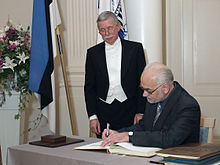Jaak Panksepp
Estonian-American neuroscientist
Jaak Panksepp (June 5, 1943 – April 17, 2017) was an Estonian-born American[1] neuroscientist, a psychobiologist, the Baily Endowed Chair of Animal Well-Being Science at Washington State University's College of Veterinary Medicine, and Emeritus Professor of the Department of Psychology at Bowling Green State University. He was born in Tartu, Estonia.

Panksepp created the term 'affective neuroscience',[2] the name for the field that studies the neural mechanisms of emotion. He was known in the popular press for his research on laughter in non-human animals.[3][4]
Panksepp died on April 17, 2017 from cancer at his home in Bowling Green, Ohio at the age of 73.[5]
More reading
change- Panksepp, Jaak; Gordon, Nakia; Burgdorf, Jeff Behavioral and Brain Sciences, Vol 25(1), Feb 2002, 43-44. doi:10.1017/S0140525X02350088
References
change- ↑ "Archived copy". Archived from the original on 2008-06-29. Retrieved 2017-04-22.
{{cite web}}: CS1 maint: archived copy as title (link) - ↑ Panksepp, J (1992). "A critical role for "affective neuroscience" in resolving what is basic about basic emotions". Psychological Review. 99 (3): 554–60. doi:10.1037/0033-295X.99.3.554. PMID 1502276.
- ↑ "MSN - Outlook, Office, Skype, Bing, Breaking News, and Latest Videos". www.msn.com.
- ↑ Panksepp, J; Burgdorf, J. (October 2000). "50k-Hz chirping (laughter?) in response to conditioned and unconditioned tickle-induced reward in rats: effects of social housing and genetic variables". Behavioral Brain Research. 115 (1): 25–38. doi:10.1016/s0166-4328(00)00238-2. PMID 10996405. S2CID 29323849.
- ↑ "Jaak Panksepp, Rat Tickler Who Revealed Emotion Lives of Animals, Dies At 73". The Washington Post. April 22, 2017. Retrieved April 22, 2017.
Other websites
change- Jaak Panksepp's Bowling Green State University website
- Jaak Panksepp's Washington State University website
- Biography at the Muskingum College website Archived 2008-06-29 at the Wayback Machine
- Interview with the Autism Research Institute Archived 2011-02-05 at the Wayback Machine
- Empathy and the action-perception resonances of basic socio-emotional systems of the brain